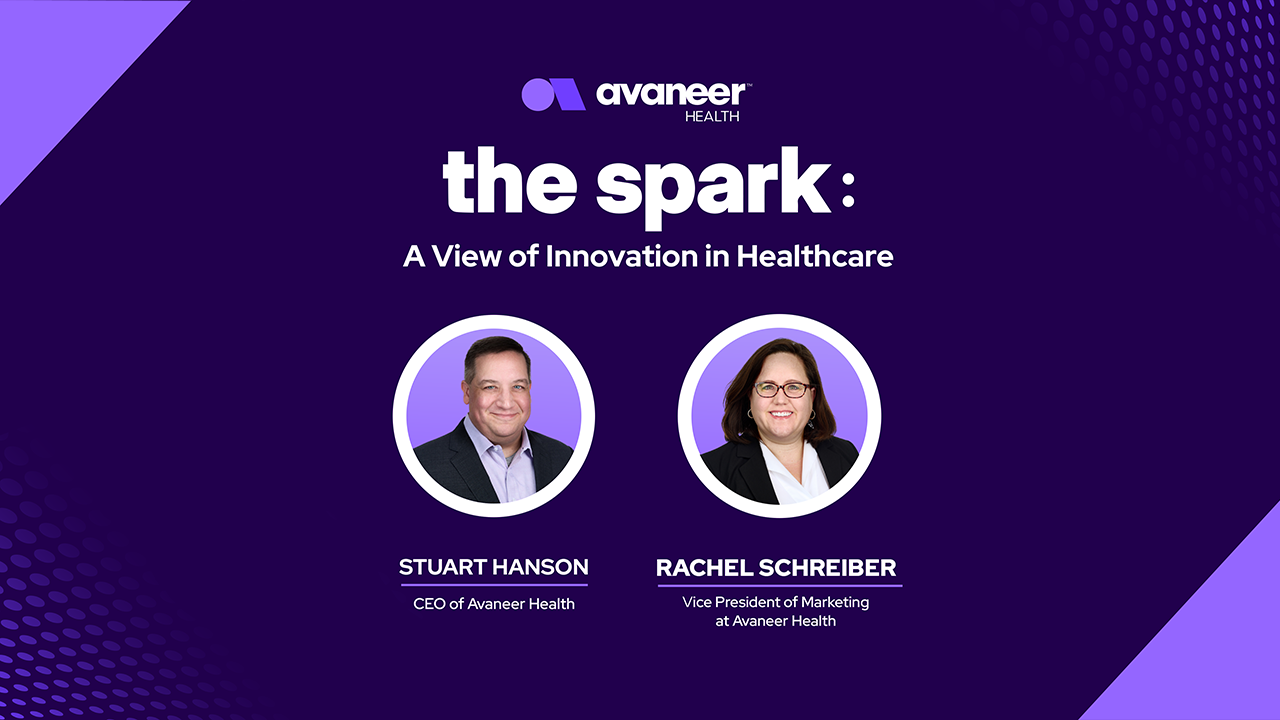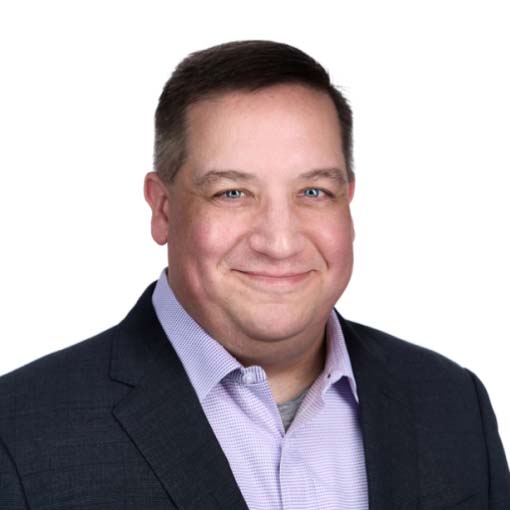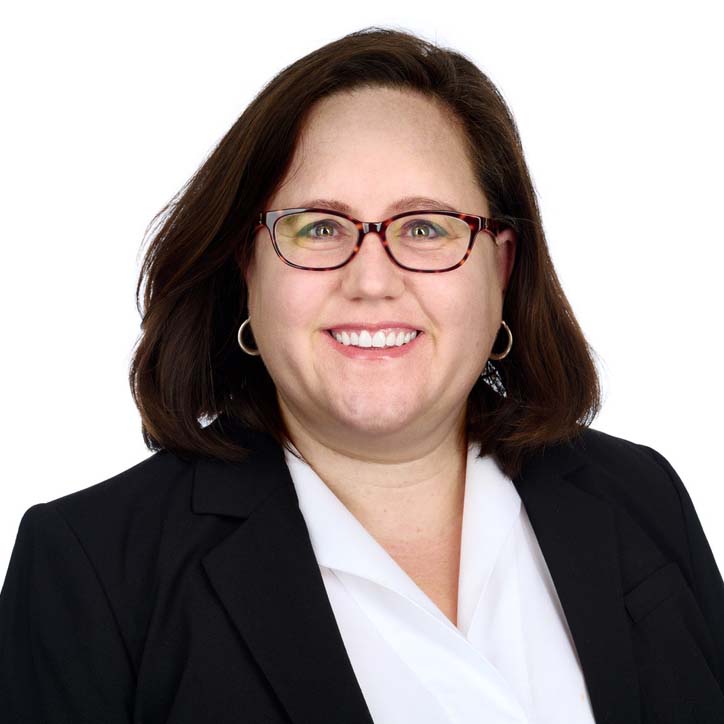
Rachel Schreiber:
Hello and welcome to the Spark, a view of innovation in healthcare. I'm Rachel Schreiber, your co-host, and in this episode, we're thrilled to share the spark that ignited the creation of this podcast. I'm joined by Stuart Hanson, our CEO and a longtime innovator in healthcare.
Stuart Hanson:
Thanks, Rachel. I'm so excited to get this started and engage in this first inaugural episode of The Spark and just share a little bit of information with our first listeners on what we're going to be covering during this series. I also want to share a little bit of the inspiration for why I got so excited when you approached me with this idea to do a podcast.
We've all heard the expression, necessity is the mother of invention, right? For those of us in healthcare, we all realize that it has never been more obvious that there's real necessity for change in healthcare. There's so many new technologies and such a differentiation in the experiences that we have between healthcare and other industries where it's more fluid and data is more prevalent and easily accessible.
But also the necessity is ] driven by the struggle that couldn't be more real, especially for healthcare providers. They're struggling with financial viability, they're struggling with physician burnout, they're struggling with frustrated patients, and they still struggle with limited access to the data they need when they need it to provide the patients with the best care possible. So I guess in other words, necessity is here in healthcare, and we all have to also recognize it's very hard to really innovate, to really invent, to really change things in healthcare. And it's hard because it's so complex in this industry. The data all needs to be protected. It's also really complex data sets, and it's all based on experiences in different organizations and different systems. And not to mention, there's not full alignment of the incentives between all of the parties involved in our insurance, from our employer perspective, from our insurance company perspective, our doctors, our physicians, our specialists, our hospitals. So those incentives are not always aligned, and sometimes the systems aren't even connected.
I think what's going to be exciting is talking to people that are dealing with some of those challenges in unique ways. I know we've got a great slate of initial speakers planned for this series that are lined up and are all tackling some of healthcare's hardest problems. And I really think that what's interesting about all of them is they're all trying to do disruptive, innovative, meaningful invention. They're all going about things a different way, and there's such an opportunity to change the lives of humans through some of the things that we're aware of that are happening in the industry. For so long, the industry's been bogged down and trapped in this complexity and lack of collaboration and fighting just basic technology challenges. I think now is the right time, and I think now we're going to have a lot of really interesting discussions with folks around this.
Rachel Schreiber:
That is so true, and it'll be really interesting to hear how organizations are looking at their processes differently and considering the patient experience. For example, it’s great that healthcare organizations are using AI, but there's an issue when they're using it to automate a broken process. We've seen the headlines about that. When they don't take a step back and look at what they're doing and how it's going to make an impact on physicians and patients, there's a negative result, and we need to be smart about how we’re using AI. That’s an example of innovation that could be great for healthcare, but we have to look at the infrastructure, look at the processes, and be brave enough to challenge those.
Stuart Hanson:
Well said. One other thing I wanted to do as part of this discussion is share a personal experience that really helped open my eyes to how the concept of disruptive can get so overused, but truly disruptive innovation or possibility thinking is what’s needed. About 10 years ago, I was asked to chair a work group within HIMSS called the Revenue Cycle Improvement Task Force. I ended up holding that role for two years, and we did a complete reset of that task force. We took a fresh look at who we wanted to have engaged, and we assembled a group of leaders from payers, providers, technology companies, outsourced revenue cycle management, and financial institutions. That was number one – we brought in a bunch of different perspectives where they also all have an impact on the patient experience.
We had an amazing facilitator from HIMSS that helped organize the series of workshops, and she asked everyone to check their roles, their organizations, all of their biases at the door, and really sit in the room as humans who experience healthcare from different perspectives. She asked us to engage in what she called possibility thinking -- let's just engage in thinking about what could be possible, what should be possible, how should revenue cycle work, how should a patient experience the healthcare system, and what would that require of data moving between their payer and their provider or from different payers to one another for referral-based care?
It took us a while. We had to put aside the data silos, forget about the technology tools and the barriers and the limitations of those, and really engage in possibility thinking. We ended up with a really inspiring vision for what could be done for the healthcare from a patient's perspective. And I know a bunch of the folks that were in that room are still engaged today with one another, collaborating, talking about problems, and really trying to tackle and embrace that vision and move the industry forward. This type of possibility thinking is what continues to inspire me and is the undercurrent for this podcast.
We’ve got a great list of innovators and thought leaders in the industry assembled to have conversations with us. The common thread we're going to hear from all of them is that at different points, they've had inspiring moments that opened their minds to possibility thinking, right? Maybe it was a really bad experience with one of their family members in the healthcare system, made them think about something a different way. But the end result is that we're going to see this common thread of people thinking outside the box and really tackling big challenges to create a different healthcare system. And that's what I think The Spark is going to become.
Rachel Schreiber:
I want to build on what you were saying about collaboration, because that's key to real change happening in healthcare. There are so many organizations out there that recognize that payers, providers, other stakeholders, need to work together, and that type of collaboration is what is going to change the processes and make healthcare better because innovating in a silo has gotten us this far, but there's so many more possibilities when we work together. Since I’ve been a part of Avaneer Health from it's early days, I’ve been excited to see how we bring together people in a room to talk frankly about how to improve a process. When the stakeholders work together and take a fresh view of the processes, workflows, and the infrastructure that's needed for healthcare to truly work well, we can see what’s possible. We go to ATMs and we can see our balance no matter where we are, and that can be possible in healthcare. We're excited to talk about innovators who are making this type of change.
Stuart Hanson:
It gets people excited to think about things a different way and actually work with your trading partners and find the mutual win-win. There are more mutual wins available and as we start to focus more on the patients, the humans, the consumers, the members that we're actually all here to serve in healthcare.
The discussions we're going to have on this podcast with these change makers in the industry who are really looking at things differently and really focused on significant possibility thinking or significant improvements is going to really be interesting.
Rachel Schreiber:
Well, that gives our listeners a good view of what we're going to be discussing and how we’ll explore viewpoints that are unique. So we plan to make good use of your time with brief, impactful conversations. Each episode's going to be about 20 to 25 minutes, and it'll be perfect for a short commute, a brief cardio workout, or while making dinner for your family. You can find The Spark on your favorite podcast platforms like Spotify, Apple Podcasts, Amazon Music, Google Podcasts, and more. We'll be hosting episodes on our website as well, so you can listen there. So please hit subscribe, explore the show notes and engage with us.
Stuart Hanson:
Thank you so much, Rachel. I am really excited to be engaged in this with you and really excited to talk to our upcoming guests. When we started putting together our list of people that we could invite onto this podcast, I was inspired just by the list of names of people that we know are doing really inspiring things. We're going to try to keep it really fun and exciting with our audience as well. Let's spark the innovation to create better patient experiences, better human experiences and healthcare.
Rachel Schreiber and Stuart Hanson discuss the inspiration behind The Spark, a podcast dedicated to discussing healthcare innovation. They emphasize the pressing need to transform outdated, inefficient processes to enhance the healthcare experience. The Spark spotlights innovators and thought leaders who are addressing healthcare's toughest challenges with creative, disruptive approaches. Key topics include cross industry collaboration, unconventional thinking, and a focus on improving workflows and processes across the healthcare sector.

Stuart is passionate about creating a better consumer healthcare experience and is focused on creating an inclusive network that ensures all stakeholders have access to comprehensive clinical and administrative data when it’s needed most.

With nearly 20 years in the health tech industry, Rachel knows marketing is about people and approaches marketing strategy and communications with that in mind. Rachel previously led a marketing consulting firm, creating growth-focused marketing strategies and tactics for health tech and health service organizations.